The dumbbell squeeze press is an underrated but effective upper-body workout that trains the chest, triceps, and anterior deltoid muscles.
The squeeze press is a variation of the traditional dumbbell chest press. During this exercise, you squeeze the dumbbells together, creating tension in your chest muscles.
Since it’s performed on a flat bench, the focus is on the entire pectoral muscles, and the squeezing action works the inner portion of the chest muscles.
The dumbbell squeeze press is also known as the close grip press or dumbbell crux press.
Want to take your gains to the next level? Discover your daily calorie needs with our free TDEE calculator
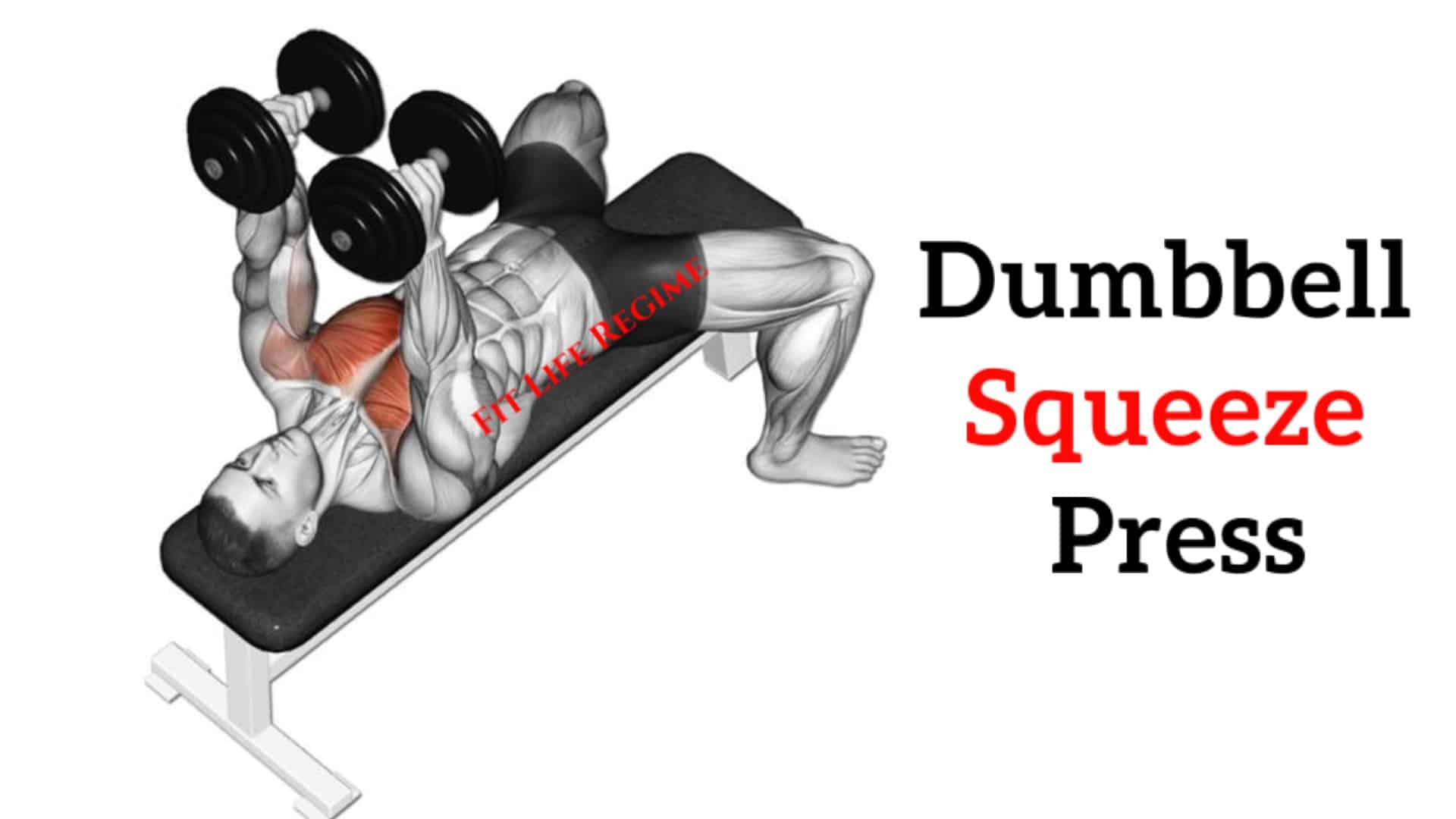
- Dumbbell Chest Squeeze Press Muscles Worked
- How to Do Dumbbell Squeeze Press
- Proper Form And Tips
- Best Variations Of Dumbbell Squeeze Press
- 1. Incline Dumbbell Squeeze Press
- 2. Decline Dumbbell Squeeze Press
- FAQs
- How does the dumbbell squeeze press work?
- Does squeeze press work the inner chest?
- How much should a squeeze press weigh?
Dumbbell Chest Squeeze Press Muscles Worked
- Primarily muscles worked: Chest, mainly upper pectoralis major and inner chest.
- Secondary muscles worked: Anterior deltoid, and Triceps brachii.
- Synergist muscles and stabilizer muscles: Rotator Cuff Muscles, Core Muscles (Rectus Abdominis, Obliques), Biceps brachii, and Serratus Anterior
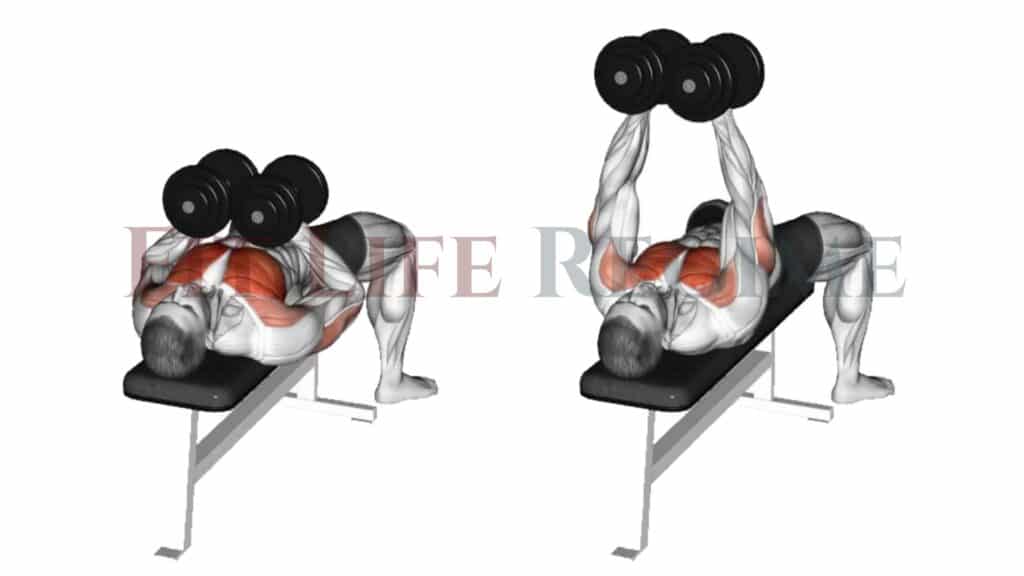
How to Do Dumbbell Squeeze Press
- Grab a pair of dumbbells that aren’t too heavy. You want to be able to squeeze them together.
- Lay back on a flat bench, feet planted firmly on the ground. Hold the dumbbells above your chest with your palms facing each other.
- Press those dumbbells together like you’re trying to make them into one super-dumbbell.
- Hold the squeeze tight and push the dumbbells straight up
- Now, slowly lower the weights back down to your chest. And I mean slowly. This is where you’ll feel it in your pecs.
- Do this for about 8–12 reps, depending on your feelings. Trust me, by the end, your chest will be on fire (in a good way).
Proper Form And Tips
- Remember, you might need to go a bit lighter than usual with this one. It’s tougher than it looks.
- Before you start the movement, pull your shoulder blades back and down. This will set a stable foundation and help protect your shoulders.
- Don’t rush the movement. Lower and raise the dumbbells in a controlled manner to maximize muscle tension.
- Keep your elbows at about a 45-degree angle to your torso. Don’t let them flare out wide – that puts unnecessary stress on your shoulders.
- Keep your movements controlled and avoid jerky motions.
- Do not extend their elbows to the sides. When your elbows drift away from your body, you are no longer performing the squeeze press.
- Always use the longest range of motion possible and control the dumbbells throughout the set.
- During the dumbbell squeeze press, you should avoid rounding your shoulders and keep your back flat against the bench.
- Ensure you maintain some tension in your abs and don’t allow your lower back to excessive arch.
- The number of sets and reps will depend on your fitness journey, but here’s a great place to start. 3–4 Sets and 8–12 Reps
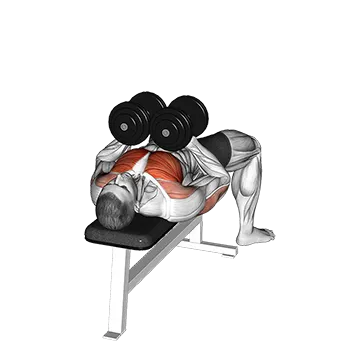
To Stay Motivated: 150+ Gym Workout Motivational Quotes To Stay Fit
Best Variations Of Dumbbell Squeeze Press
The dumbbell squeeze press can be adapted to fit your fitness level.
- If you’re new to it, make the exercise easier by using a flat bench or opting for lighter weights.
- Try the incline or decline dumbbell squeeze press for a more advanced challenge targeting different muscle fibers. You can also increase the weight, but always prioritize proper form over the load.
1. Incline Dumbbell Squeeze Press
The incline dumbbell squeeze press is an upper-body workout that engages the upper chest pec muscles, the triceps, and the anterior deltoid muscles of the shoulders.
The Incline squeeze Press is a traditional incline dumbbell chest press variation. The key difference is that the dumbbells are pressed together throughout the movement.
The angle of the adjustable bench in this variation puts more tension on your upper and inner chest muscles than a flat bench press would.
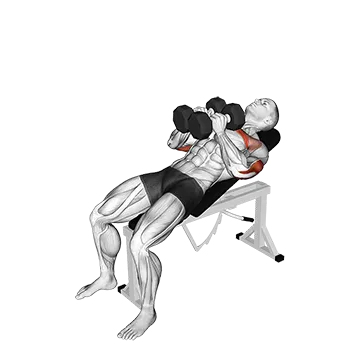
How To Do
- Take one dumbbell and grab it with both hands. Then, lie down on the incline bench (30-45 degrees).
- Place the dumbbell at the center and lift it up over your chest.
- Lower the dumbbell to touch your chest, and then push the dumbbell back up.
- Repeat.
2. Decline Dumbbell Squeeze Press
If you want to build greater thickness and strength in your lower pecs, then you should add decline dumbbell press to your training regime.
When you do the decline DB bench press, it’s important to get the angle of the bench correct. What angles should I use during the decline dumbbell bench press to hit the lower chest the most?
Research indicates that the correct angle for the decline bench press should be 15–30 degrees declined from flat to target the lower chest.
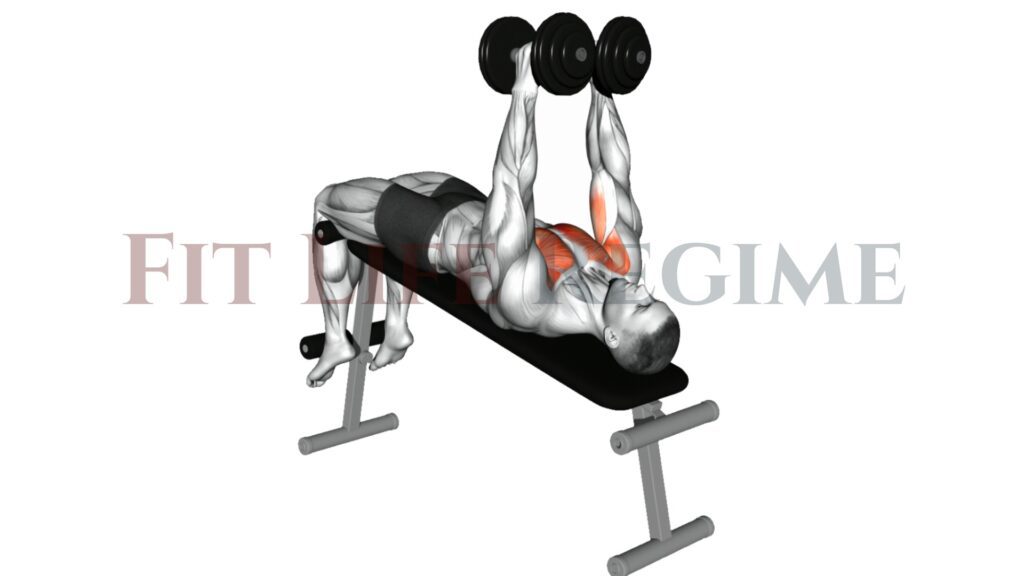
How To Do
- Grab a dumbbell in each hand and lie on your back on a decline bench. Hook your feet into the foot pad or roller.
- Place the dumbbells together side by side and lift them up over your chest.
- Lower them down together by touching each other, then push the dumbbells back up.
- Repeat
FAQs
How does the dumbbell squeeze press work?
A Dumbbell squeeze press is an upper-body exercise primarily targeting the chest, shoulder, and tricep muscles.
Does squeeze press work the inner chest?
Yes, the squeeze press is one of the best exercises to train the inner chest. During the squeeze press, you squeeze and press. By keeping pressure between the dumbbells, you engage the central (inner) part of your pecs.
How much should a squeeze press weigh?
Start with lighter weights and aim to complete 3–4 sets of 8–12 reps. Once you have perfected the form, you could experiment with heavier weights to further challenge your muscles.

Manish is a NASM-certified fitness and nutrition coach with over 10 years of experience in weight lifting and fat loss fitness coaching. He specializes in gym-based training and has a lot of knowledge about exercise, lifting technique, biomechanics, and more.
Through “Fit Life Regime,” he generously shares the insights he’s gained over a decade in the field. His goal is to equip others with the knowledge to start their own fitness journey.
